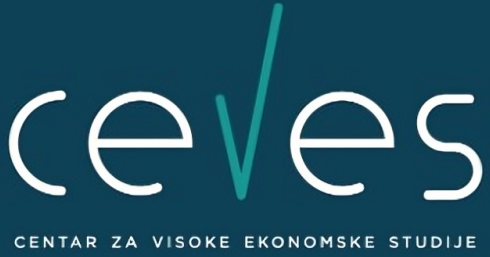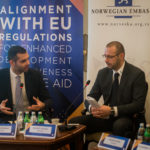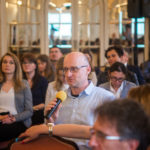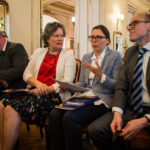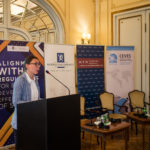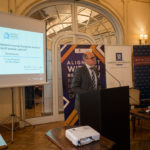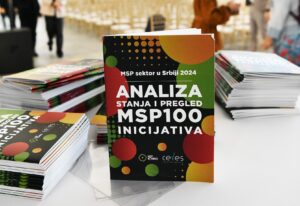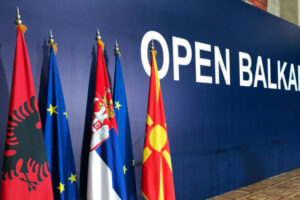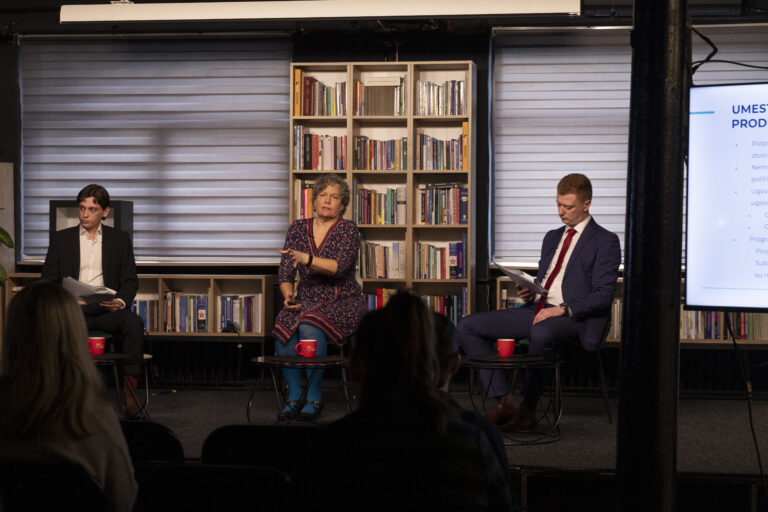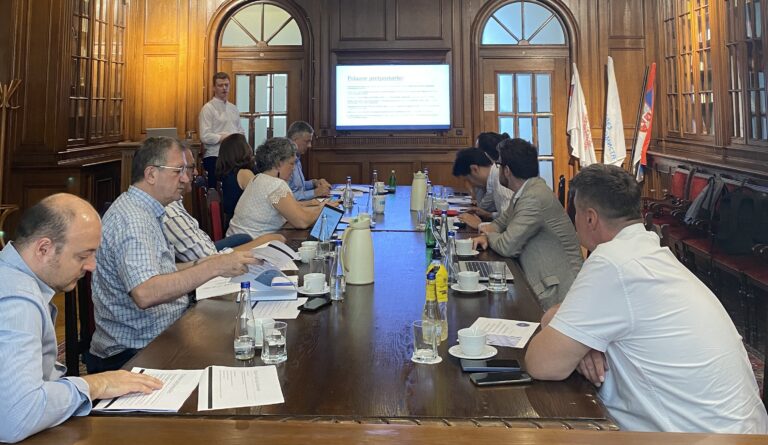Beograd, 27. maj 2019.
CEVES je 27. maja 2019. održao konferenciju pod nazivom „Državna pomoć – lokomotiva razvoja ili pogrešna skretnica? Pravila EU pomažu u proceni“. Na konferenciji analizirani su razvojni efekti politike državne pomoći u Srbiji, kao i načini na koje se postojeći pristup može obogatiti, vođen iskustvima drugih evropskih zemalja, a pogotovo Hrvatske, Slovenije i “keltskog tigra“ – Irske. Međutim, prvi korak ka tako promišljenom pristupu je puno usaglašavanje sa pravilima EU. Ova pravila, osim što štite i promovišu neometanu konkurenciju, takođe i doprinose većim razvojnim efektima iskorišćenih sredstava poreskih obveznika.
Konferencija je deo projekta „Usklađivanje sa politikom konkurencije EU, podizanje svesti o potencijalnim koristima i jačanje kapaciteta ključnih aktera u oblasti državne pomoći“. Projekat su finansijski podržali Ambasada Kraljevine Norveške u Beogradu i Balkanski fond za demokratiju Nemačkog Maršalovog fonda Sjedinjenih Država.
Konferenciju je otvorio gospodin Nemanja Šormaz, direktor CEVES-a, a gostima su se obratili Njegova ekselencija gospodin Arne Sanes Bjornstad, ambasador Kraljevine Norveške u Srbiji kao i gospođa Gordana Delić, direktorka Balkanskog fonda za demokratiju Nemačkog Maršalovog fonda Sjedinjenih Država. Gospodin Šormaz istakao je važnost promišljenog i obogaćenog pristupa u politici državne pomoći, kao i povezanost suštine i pravne forme državne pomoći u EU. Njegova ekselencija gospodin Bjornstad naglasio je da je državna pomoć kao razvojni instrument važna, ali sklona zloupotrebama. Da bi vodila efikasnoj ekonomiji i ujednačavanju regionalnih razlika među članicama EU, državna pomoć mora se zasnivati na jasnim i čvrstim pravilima, i koja kada se koristi, ne sme biti na štetu drugih tržišnih učesnika, zaključio je ambasador. Gospođa Delić izrazila je zadovoljstvo povodom organizacije ovog skupa, ističući važnost daljeg usklađivanja zemalja regiona sa regulativom EU.
Gospodin Međak, moderator prvog panela, govorio je o kompleksnosti rešavanja pitanja državne pomoći unutar Pregovaračkog Poglavlja 8 – (Pravo konkurencije). Na to se nadovezao gospodin Antonijević, predsednik Komisije za kontrolu državne pomoći, koji je opisao je trenutni proces usklađivanja sa regulativom EU, kao i korake koje Srbija tek treba da napravi. Gospođa List, nekadašnji šef Radne grupe za poglavlje 8, opisala je izazove sa kojima se suočavala Hrvatska u ovom domenu, a koji su po mnogo čemu slični Srbiji. Gospodin Nenadić, programski direktor Transparentnosti Srbija, je ukazao da se po pitanju transparentnosti situacija u Srbiji od 2015. godine blago popravila, budući da postoje nove informacije, ali da sistematične procene i dalje izostaju. Panelisti su se složili da u celom procesu transparentnost omogućava izgradnju poverenja javnosti u politike, ali i ostavlja prostor za analitička istraživanja.
Drugi panel pod nazivom „Promocija investicija i podrška MSP za brži razvoj – iskustvo Irske“ vodili su gospođa Kori Udovički, predsednica Upravnog odbora CEVES-a i gospodin Frenk Rajan, predsednik Upravnog odbora irske razvojne agencije (IDA Ireland). Gospođa Udovički je takođe istakla da regulativa EU ne vezuje ruke državama da razvojno deluju u privredi, već ograničava nesvrsishodno trošenje. Dodala je i da je politika privlačenja stranih investicija u prošlosti dovela do značajnog porasta zaposlenosti u preduzećima sa malim razvojnim efektima, ali da da se trend poboljšava. Međutim, veze između stranih kompanija i domaćih MSP i dalje su slabe. Gospodin Rajan ukazao je da je ubrzani razvoj Irske posledica konzistentnog razvojnog programa koji traje skoro 50 godina i bazira se na obrazovanju, društvenom dijalogu i dugoročnoj saradnji svih društvenih institucija. Dodao je i da je pored fokusa na reformu obrazovanja i privlačenje stranih investicija, velika pažnja bila je posvećena izgradnji domaćih MSP.
Moderator trećeg panela, Gospodin Šormaz istakao je da se Srbija nalazi na prekretnici, budući da je tema restrukturiranja vremenom zatvorena uz velike troškove, ali i da je “požar“ velike nezaposlenosti posle ekonomske krize većinski ugašen privlačenjem radno intenzivnih preduzeća. Gospodin Gazdić, direktor RAS-a, istakao je da zaista dolazi do preokreta dolaskom složenijih investicionih projekata koji pokreću zapošljavanje sa većom dodatom vrednošću, a da sledi podrška razvoju lokalnih dobavljača kako bi mogli da se u te lance vrednosti uključe. Gospodin Rajan istakao je da je i Irska prilikom formulisanja svog plana razvoja lutala dok nije jasno sagledala svoje prednosti i nedostatke. Ključ je bio u izboru sektora i postavljanju merljivih ciljeva. Gospodin Vučković, član fiskalnog saveta, naglasio je da je politika subvencionisanja investicija suštinski pogrešna i da država treba vrlo malo ili nimalo da se meša u privredne tokove, ali da je ipak donekle iznuđena činjenicom da se na nju oslanjaju i mnoge druge zemlje Evrope. Bolji rezultati bi se mogli postići unapređenjem okruženja i vladavine prava, zaključuje Vučković.
Poslednji panel moderirala je gospođa Pavlović Križanić, nezavisni ekspert za reformu javne uprave. Gospodin Plahutnik, nekadašnji predsednik Zavoda za zaštitu konkurencije u Sloveniji, istakao je da je Slovnija u svojoj politici državne pomoći iz dosta grešaka koje je pravila izvlačila pouke. Mišljenje da državna pomoć isključivo služi za održavanje preduzeća u poteškoćama napušteno je usklađivanjem sa evropskim pravilima. Sprovođenje razvojnih politika zahteva i efikasnu javnu upravu i obučene javne službenike, u čemu Srbija donekle zaostaje, ističe gospodin Maravić, direktor Nacionalne akademije za javnu upravu. Takođe, Srbiji nedostaje strateški krovni dokument koji bi ponudio državnim službenicima viziju koju bi trebalo da slede i signalizirao Nacionalnoj akademiji za javnu upravu koju vrstu kapaciteta je potrebno graditi. Gospodin Pejović, predsednik DRI, istakao je da je vizija DRI da pomaže državi da mudro upravlja resursima posredstvom pouzdanih informacija. Napomenuo je da su promenili strateški plan DRI, tako što su se više okrenuli korisnicima javnih sredstava i njihovim potrebama i pitanjima, kako bi se pospešila efektivnija i efikasnija upotreba javnih sredstava.
Gospodin Nemanja Šormaz zaključio je konferenciju ponovo ističući važnost usaglašavanja sa pravilima EU i potrebom za širom slikom unutar koje je politiku razvoja potrebno graditi, a čiji je državna pomoć samo deo. Istakao je da iako ova konferencija ne može rešiti problem njenog nedostatka, svakako čini jedan korak ka njenom formulisanju.
